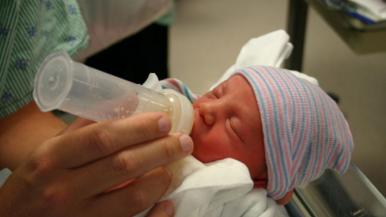As a new mother, you want what's best for your baby's health and development. And when it comes to promoting optimal health and growth in infants, nothing compares to breast milk. In fact, you could call it a baby superfood.
"I always say to mothers, 'People are spending millions of dollars for ways to get what's in your breast milk for infant formulas and medicines for adult patients. Wouldn't you want your baby to have it?'" says Paula Meier, PhD, professor of pediatrics and of women, children and family nursing. She's also the director of clinical research and lactation in Rush's neonatal intensive care unit, or NICU.
Meier is an internationally recognized leader in human milk research and practice — she previously served as president of the International Society for Research in Human Milk and Lactation. At Rush, she established the Mother's Milk Club, which provides support to help mothers provide milk for their NICU babies.
According to Meier, breast milk is better for babies than formula because it contains these four key components:
1. Protective sugars
There are special sugars in breast milk called oligosaccharides that protect the baby and program much of the baby's development.
"There's huge interest among pharmaceutical companies in harvesting them for infant formulas and medications for both children and adults," Meier says. "We've identified more than 200 oligosaccharides in breast milk, and in formula there only are four or five of them, made from plants."
2. Stem cells
There are stem cells in breast milk that are able to develop into many different types of tissues, such as the brain, the lung, the liver.
A human infant consumes millions of these cells each day. There is much interest in isolating and harvesting these cells for other medical uses as well.
Human milk is meant to grow the infant brain rapidly and specifically.
3. Lactose
"If you look at what’s special about human milk compared to all the other mammals, it's that human milk is meant to grow the infant brain rapidly and specifically," Meier explains.
Human milk has high amounts of lactose to support the rapid metabolism of the brain, which uses a lot of the body's calories during infancy.
4. Specialized fats
There are specialized fats in human milk that are deposited in the brain, because much of the growth of the brain in the first two years of life is fatty tissue. Researchers have tried to duplicate these fats in infant formulas, but they are not the same.
"While the fat is high and the sugar is high in human milk, the protein is the lowest of all of the mammals," Meier says. "Basically, the human brain is meant to grow rapidly and the body is meant to grow slowly in early infancy. Protein is significantly higher in infant formulas, and high amounts of protein in early life prompts rapid weight gain in the infant, which significantly increases the risk of childhood and adult obesity and metabolic syndrome."
Breastfeeding is beneficial for mothers, too.
"There are so many benefits for the mother as well over the lifespan, it’s not just the baby," Meier says.
During pregnancy, a mother's body mobilizes extra fat and sugar to support the fetus. The process of lactation uses these extra maternal body stores, and resets the mother's metabolism, significantly reducing her chances of many diseases later in life, including high blood pressure, obesity, cardiac problems and Type 2 diabetes. Additionally, the stem cells in the breast regulate a complete remodeling after lactation that reduces the risks of breast cancer.
Despite all these advantages, however, breastfeeding isn't universal.
"In the United States, we have regional pockets of mothers that don't breastfeed," Meier says. "Typically, mothers who do not initiate and/or maintain lactation are more likely to be young, low-income, African American, and single. Unfortunately, these also are the mothers who are most likely to deliver very low birthweight infants."
Additionally, there are many women who try to breastfeed and/or provide their milk and are not successful because of their own medical problems and/or lack of support services.
"All mothers need access to highly skilled lactation specialists in the hospital, community and at public nutrition offices," Meier says. "Many of these existing supports do not have timely service or supplies such as breast pumps that mothers need to be successful."
Breast milk donor program
Rush's donor breast milk program is designed to help low birthweight babies (infants born at less than 1500 grams, or 3.3 pounds) in Rush's NICU.
"These babies benefit most from human milk because it significantly reduces the chances of complications of prematurity, including infection, serious bowel disease and chronic lung disease," Meier explains.
A National Institutes of Health-funded study by Meier, neonatologist Aloka Patel, MD, and other colleagues at Rush found a significant relationship between how much human milk very low birthweight babies received from their mothers during the NICU stay and their neurodevelopmental outcome at 20 months. The babies who had the lowest amount of breast milk had the lowest scores on language, cognitive and motor development. The babies who had the very highest amount of human milk had significantly higher outcomes in all three of those areas.
"At Rush, whenever mother's own breast milk is not available or the mother is unable to provide enough breast milk, this program will help provide donor milk until an infant reaches 34 weeks," adds Patel.
The donor milk is obtained from human milk banks, which receive milk from lactating mothers who have been carefully screened for health behaviors and communicable diseases, following guidelines developed by the Human Milk Banking Association of North America (HMBANA).
Milk from several donors is pooled together after thawing, and then it's pasteurized to kill any bacteria or viruses, tested to ensure absence of bacteria and then refrozen. Frozen donor milk is transported from the milk bank to hospitals. HMBANA currently serves hospitals in 39 states and 264 cities.
Pasteurized donor milk retains many of the beneficial components found in mothers' own milk, which protect the infants from infection. The nutritional parts of donor milk are also easy for the infants to digest."
"In addition to the donor milk program, the Mothers' Milk Club provides intensive lactation support to the mothers of our very low birth weight babies," Patel says. "Mothers' own breast milk is the best nutrition for all infants because it promotes important health benefits right after birth and later in life, and donated breast milk is the next best thing. That's why Rush started this vital program."




